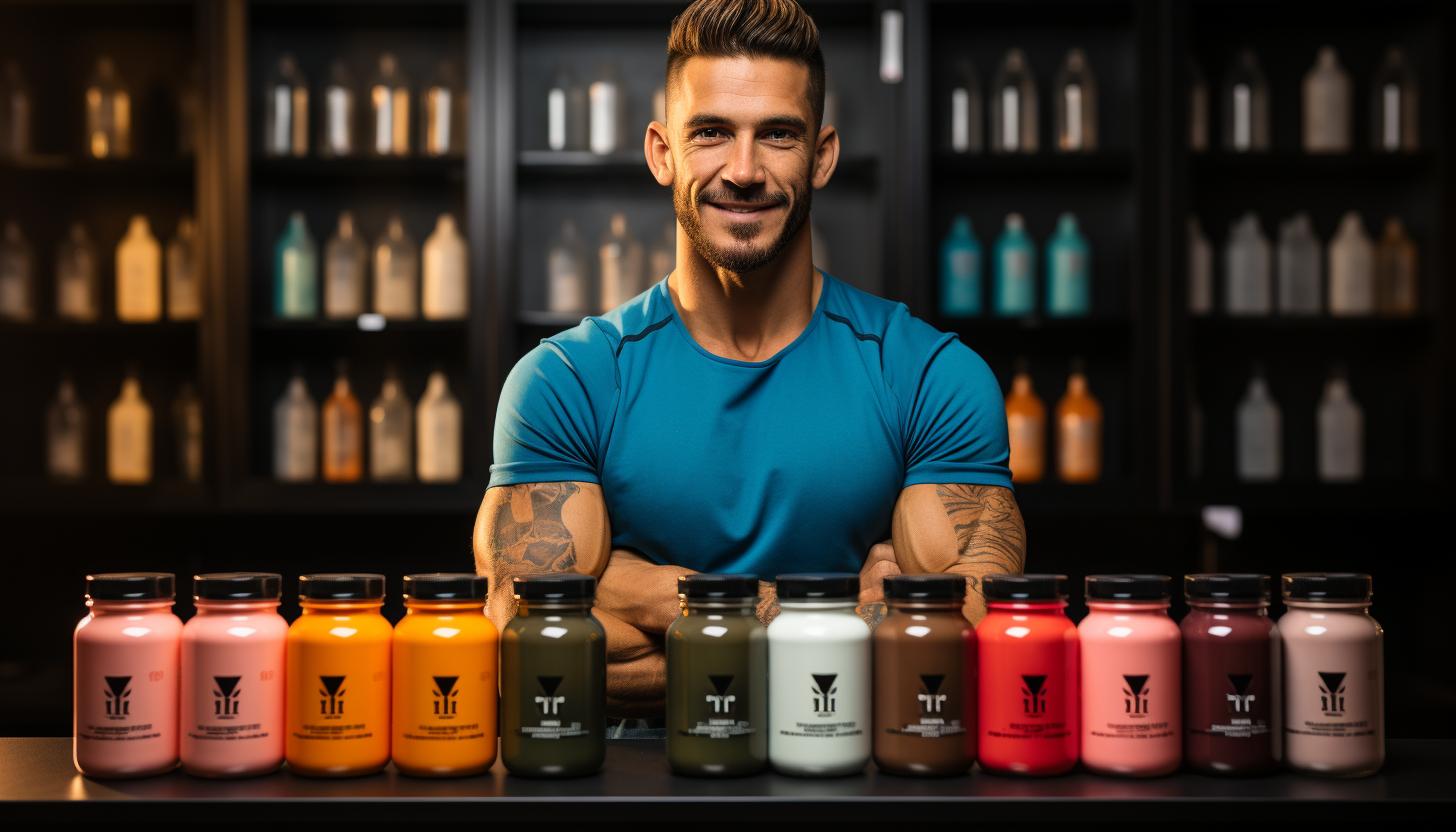Protein Supplements for Muscle Repair and Growth

Did you know that protein is a crucial component for repairing and growing your muscles? If you’re looking to maximize your fitness gains, incorporating protein supplements into your routine can make all the difference.
With so many options available, it’s important to choose the right supplement that aligns with your goals. In this article, we’ll explore the different types of protein supplements and provide practical tips on timing and dosage for optimal muscle repair.
Get ready to supercharge your workouts and achieve those gains you’ve been striving for!
The Importance of Protein for Muscle Repair and Growth

If you want to maximize muscle repair and growth, it’s important for you to consume enough protein. Protein plays a crucial role in the process of muscle repair and growth, and amino acids are the building blocks that make up proteins.
When you consume protein-rich foods or supplements, your body breaks them down into amino acids, which are then used to repair damaged muscle tissue and build new muscle fibers.
The quality of protein you consume also has a significant impact on muscle development. High-quality proteins contain all essential amino acids in optimal ratios, making them more effective for muscle repair and growth compared to low-quality proteins with incomplete amino acid profiles. Examples of high-quality protein sources include lean meats, poultry, fish, eggs, dairy products, and plant-based proteins like soybeans and quinoa.
It is worth noting that not all protein sources are equal when it comes to promoting muscle recovery. Some studies suggest that consuming whey protein shortly after exercise can enhance post-workout muscle synthesis due to its fast digestion rate and high leucine content. However, other types of protein supplements like casein or plant-based options can also be beneficial for supporting long-term muscle repair.
In the next section, we will explore different types of protein supplements that can help optimize your muscle recovery process.
Types of Protein Supplements for Optimal Muscle Recovery

There’s a wide variety of protein shakes available to help your muscles recover after a workout. These shakes are convenient and effective in providing the necessary nutrients for muscle repair and growth.
Here are four reasons why incorporating protein supplements into your post-workout routine can benefit you:
1. Plant-based protein: Plant-based protein powders, such as pea or soy protein, offer a great alternative for those who follow a vegetarian or vegan diet. These proteins are easily digestible and rich in essential amino acids, which play a crucial role in muscle recovery.
2. Muscle synthesis: Protein supplements, especially whey protein, contain high levels of branched-chain amino acids (BCAAs). BCAAs stimulate muscle protein synthesis, helping to rebuild and repair damaged muscle fibers faster.
3. Convenience: Protein shakes are quick and easy to prepare, making them an ideal option for busy individuals who want to optimize their post-workout nutrition without spending too much time on meal prep.
4. Nutrient absorption: Consuming protein immediately after exercise helps maximize nutrient absorption. By providing your muscles with the necessary building blocks promptly, you enhance their ability to repair and grow stronger.
Incorporating plant-based proteins and whey protein supplements into your post-workout routine can greatly enhance muscle recovery and promote optimal growth. Choose the shake that suits your dietary preferences and goals, ensuring you’re giving your body the fuel it needs to thrive.
How to Choose the Right Protein Supplement for Your Fitness Goals

When selecting the appropriate protein shake for your fitness goals, consider factors such as dietary preferences, ingredient quality, and taste. Choosing protein supplements that align with your specific fitness goals can greatly benefit your overall performance and muscle recovery.
Protein supplements offer several benefits to support muscle growth and repair. They provide a convenient source of high-quality protein that is easily absorbed by the body, making it ideal for post-workout recovery. Protein shakes also help in increasing muscle mass and strength when combined with a proper exercise regimen.
To choose the right protein supplement, start by considering your dietary preferences. There are various types of protein available such as whey, casein, soy, and plant-based options like pea or hemp protein. Additionally, look for products that have high-quality ingredients without unnecessary additives or fillers.
Taste is another important factor to consider when choosing a protein supplement. If you enjoy the flavor of your shake, you’re more likely to stick with it consistently. Many brands offer a variety of flavors to suit different preferences.
In conclusion, selecting the right protein supplement is crucial for achieving your fitness goals. Consider factors like dietary preferences, ingredient quality, and taste when making your choice.
Next, we will discuss timing and dosage: when and how much protein to take for muscle repair.
Timing and Dosage: When and How Much Protein to Take for Muscle Repair

For optimal results, it’s important to carefully consider the timing and amount of protein you consume to support muscle recovery. Protein is essential for repairing and building muscles, but knowing when and how much to take can make a significant difference in your progress.
Here are four key points to keep in mind:
1. Timing: Consuming protein within 30 minutes after your workout can maximize muscle repair and growth. This is known as the ‘anabolic window,’ where your muscles are most receptive to nutrients. Aim for a protein-rich snack or shake during this time frame.
2. Protein Intake: The recommended daily intake of protein for active individuals is about 0.8-1 gram per pound of body weight. However, if you’re looking to optimize muscle repair, increasing your intake to 1.6-2 grams per pound may be beneficial.
3. Distribution: Spreading out your protein intake throughout the day can help stimulate muscle protein synthesis more effectively than consuming large amounts in one sitting.
4. Quality Matters: Choose high-quality sources of protein such as lean meats, poultry, fish, eggs, dairy products, legumes, and plant-based proteins like soy or pea protein powder.
Maximizing Muscle Growth: Combining Protein Supplements With Exercise and Nutrition

To optimize muscle development, it’s crucial to combine protein supplements with exercise and proper nutrition. Protein supplementation has numerous benefits for overall health and well-being, particularly when it comes to muscle growth and repair. When you engage in intense physical activity, your muscles undergo stress and damage. Protein plays a vital role in repairing and rebuilding these muscles, allowing them to grow stronger over time.
One key benefit of protein supplementation is its ability to reduce muscle soreness and fatigue. By providing your body with an adequate amount of protein, you can effectively support the recovery process after a workout. Studies have shown that consuming protein immediately after exercise can enhance muscle protein synthesis, leading to faster recovery and reduced muscle soreness.
In addition to reducing muscle soreness, protein also plays a crucial role in overall health and well-being. It provides essential amino acids that are necessary for various bodily functions, such as cell repair, hormone production, and immune system function. Including protein-rich foods or supplements in your diet can help ensure that you meet your daily requirements.
To illustrate the importance of combining protein supplements with exercise and nutrition, consider the following table:
| Benefit | Role of Protein |
|---|---|
| Promotes Muscle Growth | Provides essential building blocks |
| Reduces Muscle Soreness | Enhances recovery process |
| Supports Overall Health & Well-being | Necessary for various bodily functions |
Conclusion
In conclusion, protein supplements are a crucial tool for muscle repair and growth in your fitness journey. By providing the necessary building blocks for your muscles, these supplements aid in faster recovery and promote optimal muscle development.
When choosing a protein supplement, consider factors such as your fitness goals and dietary restrictions to find the right fit. Remember, timing and dosage are key to maximize the benefits of these supplements.
So go ahead, grab your favorite protein shake and watch those gains skyrocket! The proof is in the pudding – or should I say, whey?






